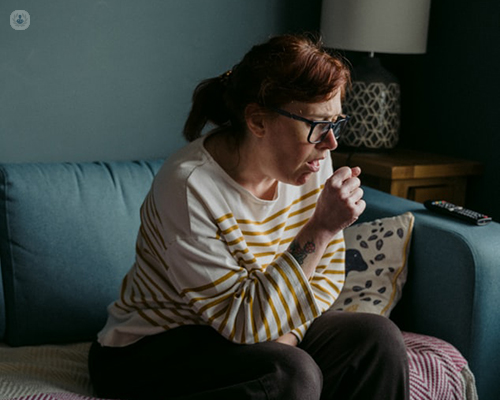Coronavirus and pneumonia: how can the lungs be treated?
Written by:In the most severe cases of coronavirus (COVID-19), pneumonia is a serious complication of the infectious disease. It is more common in those who already have heart and/or lung diseases, such as severe asthma, or those who are elderly and have a weakened immune system.
We’ve asked one of our top respiratory physicians Dr Muhammed Raashed to explain the science behind how coronavirus can cause pneumonia, including how the lungs try to respond to the infection, how it can be managed and treated, and whether you can fully recover.

How does a coronavirus cause pneumonia?
The virus gets airborne through respiratory droplets generated by a cough or a sneeze and finds its way into our bodies from the lining of the nose, mouth or eyes, as someone becomes infected.
At this early or mild stage, the symptoms are minimal and in the vast majority of cases (up to 80%), the virus is contained by host defences at this point. These mild to moderate cases settle spontaneously and people recover in two weeks by resting at home.
In up to 20% of cases, once the virus has made its ground in the upper respiratory tract (nose, throat and windpipe) it travels down with our breath into our lungs where it attaches to the cells of the lungs lining and is engulfed (endocytosis). Inside the cell, the virus finds its way into the ribosome (protein-making factory of the cell) and tells it to make copies of its own RNA.
Once they have successfully multiplied into numerous virions, the cells rupture releasing more into the lung tissues, which infects surrounding tissues resulting in pneumonia. This causes cough, fever and breathlessness.
How do the lungs respond to the infection?
The lung tissue responds to this infection by releasing numerous chemicals called inflammatory mediators (cytokines, leukotrienes, prostaglandins etc.), which aim to kill the viruses and contain the infection.
These chemicals fight with viruses inside the lungs causing inflammation of the lungs. One such substance called cytokines can cause "cytokine storm,” which is an overwhelming inflammatory response that causes florid widespread inflammation of the lungs, severe bilateral pneumonia and death.
The alveoli (air sacs) gets filled with inflammatory exudate and a spongy lung becomes filled with fluid and solidified. This is called ‘consolidation of lungs’ and is a key feature of pneumonia.
How is pneumonia treated?
Once the lungs are consolidated, the air we breathe cannot get to the air sacs where oxygen is absorbed in the blood and the person becomes hypoxic (a drop in oxygen level).
This can be treated with supplemental oxygen or, in more severe cases, high flow oxygen and CPAP. In most severe cases, the person cannot breathe and require intubation and ventilation by a life support machine. Once it comes to this point, the survival rate is 50%.
This effect is much more apparent in people with underlying lung disease who have limited lung capacity. Since there are no antiviral medications, the only treatment is supportive, such as rest, supplemental oxygen, IV fluids and if necessary, ventilation.
Thus the availability of the ventilators would determine our ability to save lives. Hence why there is currently a national drive to manufacture ventilators and Dyson has been contracted to manufacture 10,000 ventilators.
Does pneumonia cause permanent lung damage?
For those, who recover from pneumonia, usually, there is no lasting damage.
Dr Raashed is an expert in treating persistent cough, asthma, COPD and lung disease. You can book an appointment to see him via his Top Doctor’s profile here for his specialist advice.


